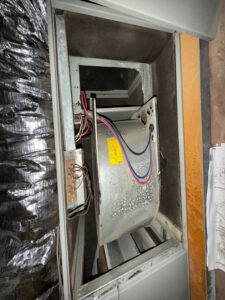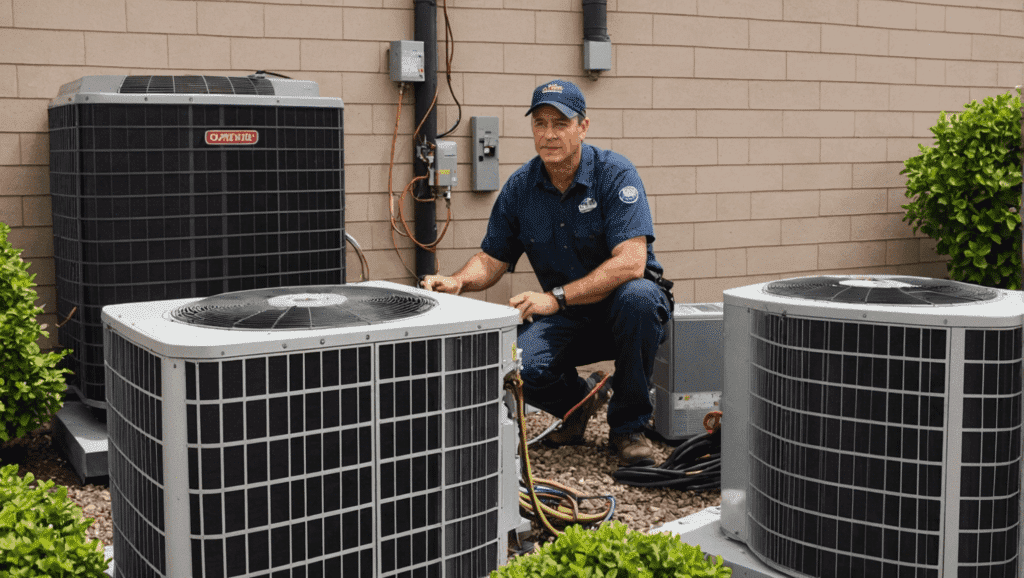Tired of sky-high energy bills and constant breakdowns?
If you’re like most people, you probably don’t think about your AC until it’s on the fritz. But here’s the thing: AC repair doesn’t always have to be a crisis. Most of the time, it’s about taking proactive steps to keep your system running smoothly.
So, let’s dive into the top 10 AC repair tips that will keep your unit running at peak performance—and save you money along the way. If you’re tired of throwing money at repairs and energy bills, these AC repair tips are your answer.

1. Change Your Filters Regularly
Let’s start with the basics. When was the last time you changed your AC filter? If you’re scratching your head, you’re probably overdue. Dirty filters restrict airflow and make your AC work harder, which translates into higher energy costs and more AC repair calls.
Pro Tip: Change your filters every 1-3 months. It’s the easiest and cheapest way to avoid bigger issues down the road.
2. Keep the Area Around Your AC Unit Clean
Your outdoor unit is a workhorse. It’s exposed to dirt, debris, and the elements, so it’s crucial to keep it clear. If leaves, branches, or dirt are obstructing the airflow around your AC, it can cause the system to overheat, putting more stress on the motor and compressor. That leads to AC repair and potentially expensive fixes.
Pro Tip: Clear the area around your AC unit at least twice a year. Make sure it has 2-3 feet of clearance to breathe.
3. Set Your Thermostat Correctly
Your thermostat controls the whole system. If it’s not set properly, your AC will work harder than it needs to, which not only wastes energy but can also increase the likelihood of AC repairs. Keep your thermostat set to 78°F in the summer.
Pro Tip: Invest in a programmable thermostat. This helps you control your system more efficiently and even avoid running the AC when you don’t need it.
4. Seal Your Ductwork
Leaky ducts are like a slow drain on your wallet. If your ducts are leaking, air is escaping, and your AC has to work harder to keep your home cool. This results in higher energy costs and, over time, leads to AC repair. Make sure your ducts are sealed and insulated properly.
Pro Tip: Have a professional inspect your ducts for leaks during your annual maintenance.
5. Clean Your Coils and Fins
Dirty condenser coils are one of the most common reasons for AC failure. If dirt builds up on your coils, it reduces your AC’s ability to release heat, causing the system to overheat and fail. Same goes for the fins—they can bend and block airflow, which leads to costly AC repair.
Pro Tip: Clean your coils and fins every year to keep things running smoothly. It’s worth the few bucks you’ll spend on cleaning products.
6. Check the Refrigerant Levels
Low refrigerant can cause your AC to freeze up or fail altogether. If you notice your AC isn’t cooling as effectively as it used to, it could be a refrigerant issue. AC repair technicians can check the levels and fix any leaks before they lead to major system damage.
Pro Tip: If your system is low on refrigerant, don’t just top it off. A leak could be the cause. Always have a professional check it out.
7. Use Ceiling Fans to Help Your AC
Ceiling fans circulate the air and make it feel cooler, which means you won’t need to set your thermostat as low. This reduces the strain on your AC and helps prevent unnecessary wear and tear.
Pro Tip: Use your ceiling fans in tandem with your AC to reduce energy costs and avoid overworking your system.
8. Schedule Regular AC Maintenance
Think of your AC like a car. You wouldn’t drive it for years without checking the oil, right? Same goes for your AC. Regular maintenance helps catch small problems before they turn into big, expensive AC repair issues. Schedule a check-up at least once a year.
Pro Tip: During a maintenance visit, the technician will clean the coils, check the refrigerant levels, and inspect the overall system, which can prevent a major breakdown.
9. Don’t Overcool Your Home
It’s tempting to crank the AC to the lowest setting when it’s hot outside, but doing so can overwork your system and increase the chances of needing AC repairs. Instead, set your thermostat to 78°F during the day and 82°F at night. Your AC will last longer, and you’ll see lower energy bills.
Pro Tip: If it’s especially hot, use fans to help circulate air and reduce the strain on your AC unit.
10. Turn Off Your AC When You Leave the House
This one’s simple. If you’re not home, your AC doesn’t need to be running. Leaving it on when you’re away for hours is a surefire way to waste energy and eventually lead to costly AC repair.
Pro Tip: Use a smart thermostat to program your AC to turn off when you’re not home and cool the house before you return.
Why You Need Regular AC Repair
Here’s the reality: AC repair doesn’t always have to be a major fix. In fact, the most costly AC repairs happen when minor issues go unaddressed. By following these simple tips, you can avoid expensive repairs and keep your system running smoothly all year round.
The truth is, your AC is an investment. Treat it well, and it will treat you well in return. Save money on AC repair by being proactive and following these tips—your future self will thank you.
Frequently Asked Questions About AC Repair
Q: How often should I schedule AC maintenance?
A: At least once a year, ideally before summer. This way, your system is ready to handle the heat without unexpected breakdowns.
Q: Can I clean my AC unit myself?
A: Absolutely. You can clean the coils and replace the filters yourself. But for anything beyond that—like refrigerant issues or leaks—you’ll want to call in a professional.
Q: What are the signs that my AC needs repair?
A: If it’s blowing warm air, making strange noises, or not cooling your home properly, it’s time for AC repair. You should also keep an eye on rising energy bills, which may indicate that your AC is working harder than it should.
Q: How do I know if my AC is low on refrigerant?
A: If your AC isn’t cooling effectively, there’s a good chance you’re low on refrigerant. An AC repair professional in Gilbert, AZ can check the levels and refill it if necessary.
Ready to Save Big on AC Repair?
Taking care of your AC now means fewer surprises and major savings down the road. Don’t wait for your system to break down—implement these tips today to keep your unit in top shape all year long.
And when you need AC repair, call us at Olive Air and Heating. We’ll make sure your system stays cool and your wallet stays full.



